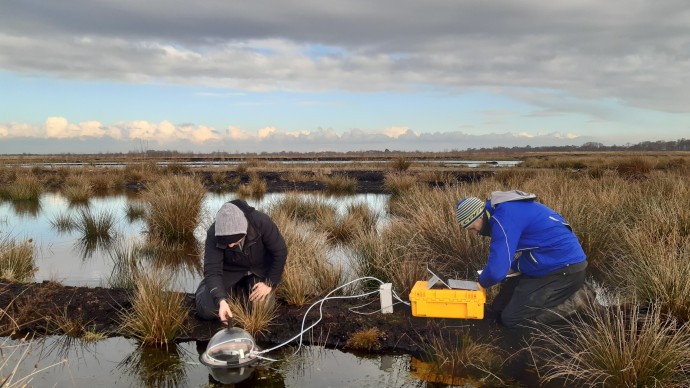How hydrogen fuels can provide the world with clean, green energy
Header image

Standfirst
It was once the stuff of science fiction, a world powered by clean and green energy – no harmful emissions, only water.
But that is the promise of hydrogen power, an exciting new technology with the promise to power everything from cars to buildings.
Main story
In the race to reach a net-zero world powered by renewable energy sources, hydrogen is rapidly being considered as a key component of the energy transition for many governments, businesses, and organisations all over the globe.
The UK has legally committed to reach net-zero by 2050 and successive governments have developed strategies to boost a hydrogen economy as a crucial step to achieving this goal.
Greater Manchester is aiming to become carbon neutral by 2038, 12 years before every other UK target. This is a highly ambitious goal that reflects the region’s commitment to the environment. A leading force in this campaign is Manchester Metropolitan’s Hydrogen Fuel Cell Innovation Centre.
The centre focuses on research for fossil fuel alternatives and supporting business to exploit the opportunities. It has been visited by international delegations from all over the world as a key hub for hydrogen innovation and research.
Clean energy
Very simply, a fuel cell combines hydrogen with oxygen to create electricity, with clean water the only byproduct.
Amer Gaffar, Director of the Manchester Fuel Cell Innovation Centre (MFCIC), explains more: “The centre was born to support businesses whose ambitions need to be underpinned with academic expertise.
We have a fantastic group of academics spanning from electrochemists to engineers, and we provide businesses access to the facility and help them test fuel cells, electrolysers or improve the material that goes into these devices.
We have a fantastic group of academics spanning from electrochemists to engineers, and we provide businesses access to the facility and help them test fuel cells, electrolysers or improve the material that goes into these devices.
The University is also part of the Manchester Climate Change Partnership (MCCP), established to help Manchester limit its greenhouse gas emissions and has developed a hydrogen and fuel cell strategy for the region. As of now, it is the only regional one of its kind in the UK.
This level of innovation indicates why Gaffar and his colleagues have been involved with multiple inquiries at government level on the role of hydrogen and fuel cells in a net zero economy.
“We have really developed one of the best place-based agendas for hydrogen in the UK now,” Amer said. “This has come from that partnership approach over the last decade, where we focus on research, but that research will feed into the development of green technologies, including hydrogen, across the city region.
“It has helped build infrastructure ambitions for Greater Manchester. It has helped to understand what the occupational profiles are where hydrogen will play a major role in the future economy.”
By 2050, we could all be travelling around by hydrogen buses or trains. Hydrogen could be powering our industrial base.
Over 85% of homes in the UK are currently heated by natural gas, a cleaner alternative to coal but still resulting in pollution of carbon dioxide, in the future if the network is built Hydrogen and fuel cells could be powering our homes.
For this to change, there would need to be a huge transformation in infrastructure.

Industrial might
This is why the MFCIC works with partners from the Greater Manchester Combined Authority to the European Union to electronics giant Panasonic.
Maria Gonzalez, Principal for International Relations for Greater Manchester Combined Authority, said: “We have a very close relationship with the Fuel Cell Innovation Centre. It is incredible what has been achieved in the past ten years. They have always had a very clear long-term vision on how hydrogen could play a role in helping Greater Manchester become a greener place on the global stage.
“The Fuel Cell Innovation Centre is always at the top of the list for international delegations because it is a key player in Greater Manchester’s goal to become a zero-carbon city by 2038. It is also great in terms of contracting the best talent and investors to Manchester, a really good example of that is the partnership deal that we have been developed with Japan and the city of Osaka.”
But there is also another issue and Gaffar illustrates how widely this needs to be addressed outside of research and policy - and why the University has a key role.
“Where are the future roles in a hydrogen economy going to come from?,” he says.
If we take the idea that hydrogen is going to be a key part of our net zero journey, then we need to ensure that we provide the right skills, the right courses and the right opportunities for graduates.
If we take the idea that hydrogen is going to be a key part of our net zero journey, then we need to ensure that we provide the right skills, the right courses and the right opportunities for graduates.
“We are not only focusing on innovation in a sector that requires lots of these companies to improve their materials or devices and commercialise them. We also need to ensure that we can provide the workforce that is required to support an economy that could be worth 8 trillion in 2050.
“So, there are many of these initiatives across the combined authorities in the region and the centre really works with them as an educational landmark.”
The next 10 years will see substantial change in the hydrogen industry and the MFCIC will continue to work with people and organisations across the world. Gaffar emphasises the help that the centre provides to local businesses.
“This infrastructure will get built and it will start getting built over the next decade. It’s important that people understand what this infrastructure is there to do and not be nervous of it. If there are questions that need answering, that is exactly why we exist and we are here to help.”
Watch Amer's interview
The Science and Industry Museum showcases the work of the Manchester Fuel Cell Innovation Centre currently on display in the museum's Revolution Manchester gallery.More stories
Discover more of our research
-
![An aeroplane taking off, seen from inside an empty passenger lounge]()
Cleaner and greener flying
Find out more -
![Dr Paul O'Hare stood among wildflowers with Manchester post-industrial skyline behind him]()
Greening the city – Manchester’s changing climate
Find out more -
![Researchers taking measurements from a peat bog in the Peak District]()
A natural solution
Find out more -
![Professor Liz Barnes, head of Manchester Fashion Institute, in a fashion room]()
A circular future
Find out more -
![A Golden Parakeet with its wings spread in the air]()
All creatures great and small – protecting biodiversity
Find out more
About 200 years
Manchester Met celebrates two centuries of driving progress through excellent education and research.
-
![200 years 1824-2024]()
200 years
Find out more -
![Siemens Chief Executive Carl Ennis posing with the firms degree apprentices]()
Driving economic growth
Find out more -
![Two nurses standing together and smiling]()
Transforming health
Find out more -
![A digital image of the university's arts buildings]()
Championing creative excellence
Find out more









